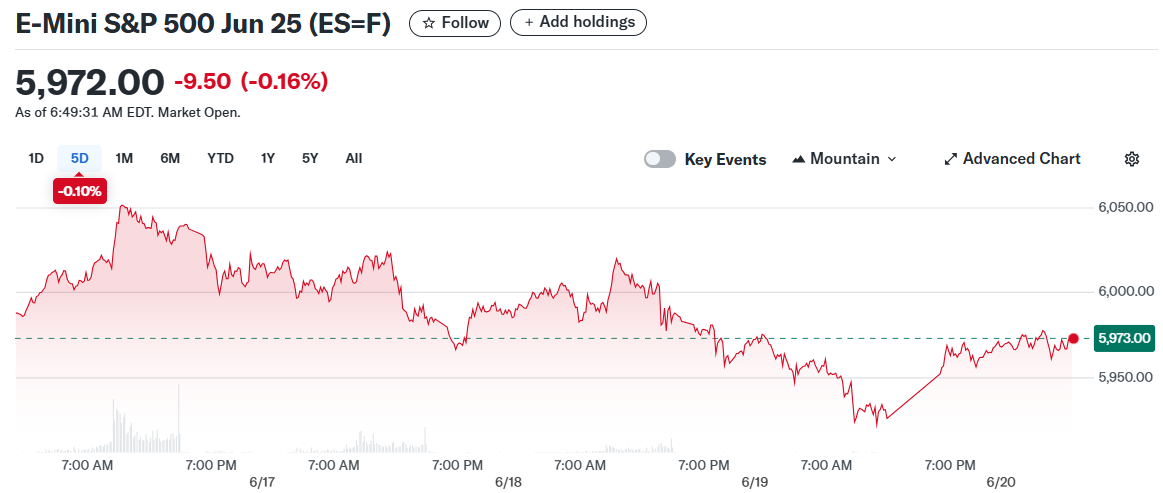TLDR
- President Trump set a two-week deadline to decide on US military involvement in the Israel-Iran conflict, causing market uncertainty
- Israeli forces struck Iranian nuclear facilities near Arak overnight, with the International Atomic Energy Agency confirming damage to key buildings
- Oil prices initially dropped but later rose over 1% as traders priced in supply disruption risks from potential Strait of Hormuz blockade
- US stock futures fell 0.2-0.3% as investors weighed geopolitical risks and possibility of direct American military intervention
- European foreign ministers are meeting with Iran’s Foreign Minister in Geneva to discuss nuclear program and potential de-escalation
US stock futures declined Friday morning as President Donald Trump announced a self-imposed two-week deadline to decide whether America will directly enter the escalating Israel-Iran conflict. The announcement, delivered through the White House press secretary on Thursday, added fresh uncertainty to already volatile global markets.
U.S President Donald Trump has given a deadline to Iran before American Military support against Iran. This comes after an Israeli hospital was hit in an airstrike. #donaldtrump #trump #israel #iran #war #7NEWS pic.twitter.com/zaFmquwB1C
— 7NEWS Australia (@7NewsAustralia) June 19, 2025
Futures on the Dow Jones Industrial Average and S&P 500 both dropped 0.2% in pre-market trading. Nasdaq 100 contracts fell approximately 0.3% as investors processed the geopolitical developments.

Trump’s deadline represents a shift from earlier rhetoric that included calls for Tehran’s evacuation. The president framed the two-week window as an opportunity for diplomatic efforts to succeed before considering military options.
Markets had been closed Thursday for Juneteenth, giving investors a brief pause as international headlines intensified. The conflict, now entering its second week, has kept major US indices on track for weekly losses.
Israeli forces conducted overnight strikes on Iranian military targets, deploying more than 60 fighter jets according to Israel Defense Forces statements. The attacks targeted dozens of military installations across Tehran and other locations.
Nuclear Facility Damage Confirmed
The International Atomic Energy Agency confirmed Friday morning that Israeli strikes damaged a nuclear facility under construction near Arak. The global nuclear watchdog reported that key buildings at the site sustained damage from the attacks.
Iran responded by launching attacks on the southern Israeli city of Beersheba. A hospital in the city was hit Thursday, injuring at least 71 people according to Israel’s health ministry.
Iranian officials claimed they targeted a nearby building and described the hospital damage as “superficial” caused by a “blast wave.” The exchange represents the latest escalation in the ongoing conflict.
Oil Markets Show Volatility
Oil prices initially fell Friday morning but reversed course as geopolitical tensions persisted. Brent crude dropped 2% to $77.30 per barrel early in the session before recovering.
West Texas Intermediate, the US benchmark, traded around $74 per barrel after similar volatility. Both crude benchmarks later rose over 1% as traders factored in supply disruption risks.
The Strait of Hormuz remains a key concern for energy markets. Iran could potentially block this critical shipping route, which handles one-fifth of the world’s oil trade.
Iran maintains its position as a major oil producer despite current sanctions. While no production losses have been reported, further conflict escalation could disrupt global supply chains.
European foreign ministers from France, the UK, and Germany are meeting with Iranian Foreign Minister Abbas Araghchi in Geneva Friday. The talks focus on Iran’s nuclear program and potential paths to de-escalation.
The US and European nations have stated they will not accept Iran obtaining nuclear weapons. These diplomatic efforts come as Trump’s deadline approaches and military options remain under consideration.
Federal Reserve Chair Jerome Powell’s recent comments continue influencing market sentiment. Powell reiterated Wednesday that rate decisions will remain “data-dependent” with no rush to ease monetary policy.






